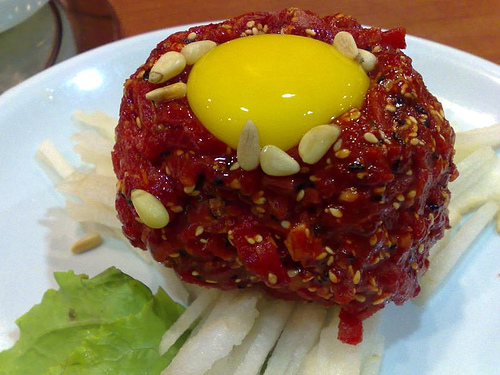As more towns in Florida embrace legalized doggie dining, Japan is grappling with a lack of registration and poor sanitation.
The Japanese version is not-so-much about owners bringing their pooches to dinner, it’s for career-minded 30-somethings who are too busy to care for a pet to have 30 minutes of animal interaction.
The Daily Yomiuri Online reports the trend began with so-called cat cafes, and there are now more than 120 establishments nationwide  where people can enjoy the healing effects of being surrounded by animals such as dogs, birds, goats and rabbits.
where people can enjoy the healing effects of being surrounded by animals such as dogs, birds, goats and rabbits.
However, some shops have not registered as required with local governments, and experts are warning them to be aware that some diseases can be transmitted from animals to people.
According to Norimasa Hanada, 39, who opened a cat cafe ahead of the boom in 2005 in Machida, western Tokyo, and runs a Web site "Zenkoku Neko Cafe Map," there are at least 120 cat cafes nationwide. Newer shops featuring dogs, goats and birds also have have opened recently, he said.
Besides offering cats to pet, some cafes have begun activities to help protect the animals. Ekoneko, a cat cafe that opened in Tokyo’s Nerima Ward in October, works with Little Cats, a nonprofit organization based in Kofu that works to find homes for stray cats.
According to the Tokyo metropolitan government’s animal care counseling center, animal cafes at which customers pay admission fees fall under the category of "exhibition" facilities, and are regulated by the Animal Protection Law like zoos and aquariums.
For this reason, such shops are required to register with prefectural governments as businesses that deal with animals and employ a regular .jpeg) staff member possessing an animal health technician license or other such qualification.
staff member possessing an animal health technician license or other such qualification.
A cafe in Nerima Ward, which charges 200 yen per 30 minutes on top of a drink fee, touts on its Web site that customers can play with animals at the shop.
"I didn’t even know about the registration requirement. I don’t have time to obtain the qualification," the cafe’s female owner said.
A female manager of a cafe in Tokyo, who was patting an animal’s head over a fence, said: "We haven’t registered as we just keep the animals outside the cafe. These animals are not exhibited inside the premises."
She said the center staff who visited her cafe to confirm the situation had judged it was unnecessary for the establishment to register as it did not charge a separate fee to exhibit the animals.
.jpg) Press reported. The restaurant is run by Foods Forus Co, based in nearby Kanazawa.
Press reported. The restaurant is run by Foods Forus Co, based in nearby Kanazawa.
 techniques in Australian abattoirs were "top class and only getting better." By Feb. 6, 1995, Garibaldi Smallgoods declared bankruptcy. Sales of smallgoods like mettwurst were down anywhere from 50 to 100 per cent according to the National Smallgoods Council.
techniques in Australian abattoirs were "top class and only getting better." By Feb. 6, 1995, Garibaldi Smallgoods declared bankruptcy. Sales of smallgoods like mettwurst were down anywhere from 50 to 100 per cent according to the National Smallgoods Council.(1).jpg) bacteria was confirmed in the stool of those who suffered the food poisoning.
bacteria was confirmed in the stool of those who suffered the food poisoning.(11).jpg) be closed until Sunday. The sickness tally rose to 1,048 on Tuesday.
be closed until Sunday. The sickness tally rose to 1,048 on Tuesday..jpg) previous day which was cooked in the school kitchens for some 3,100 students.
previous day which was cooked in the school kitchens for some 3,100 students.  operation, according to a statement by the U.S. attorney’s office.
operation, according to a statement by the U.S. attorney’s office.
 where people can enjoy the healing effects of being surrounded by animals such as dogs, birds, goats and rabbits.
where people can enjoy the healing effects of being surrounded by animals such as dogs, birds, goats and rabbits..jpeg) staff member possessing an animal health technician license or other such qualification.
staff member possessing an animal health technician license or other such qualification. “Dude, I’m on the toilet, and I’m e-mailing you,” or something like that.
“Dude, I’m on the toilet, and I’m e-mailing you,” or something like that. At least 11 customers have been stricken with E. coli O157 in seven prefectures including Tokyo, Osaka and Kyoto, according to the restaurant chain operator and local governments.
At least 11 customers have been stricken with E. coli O157 in seven prefectures including Tokyo, Osaka and Kyoto, according to the restaurant chain operator and local governments.